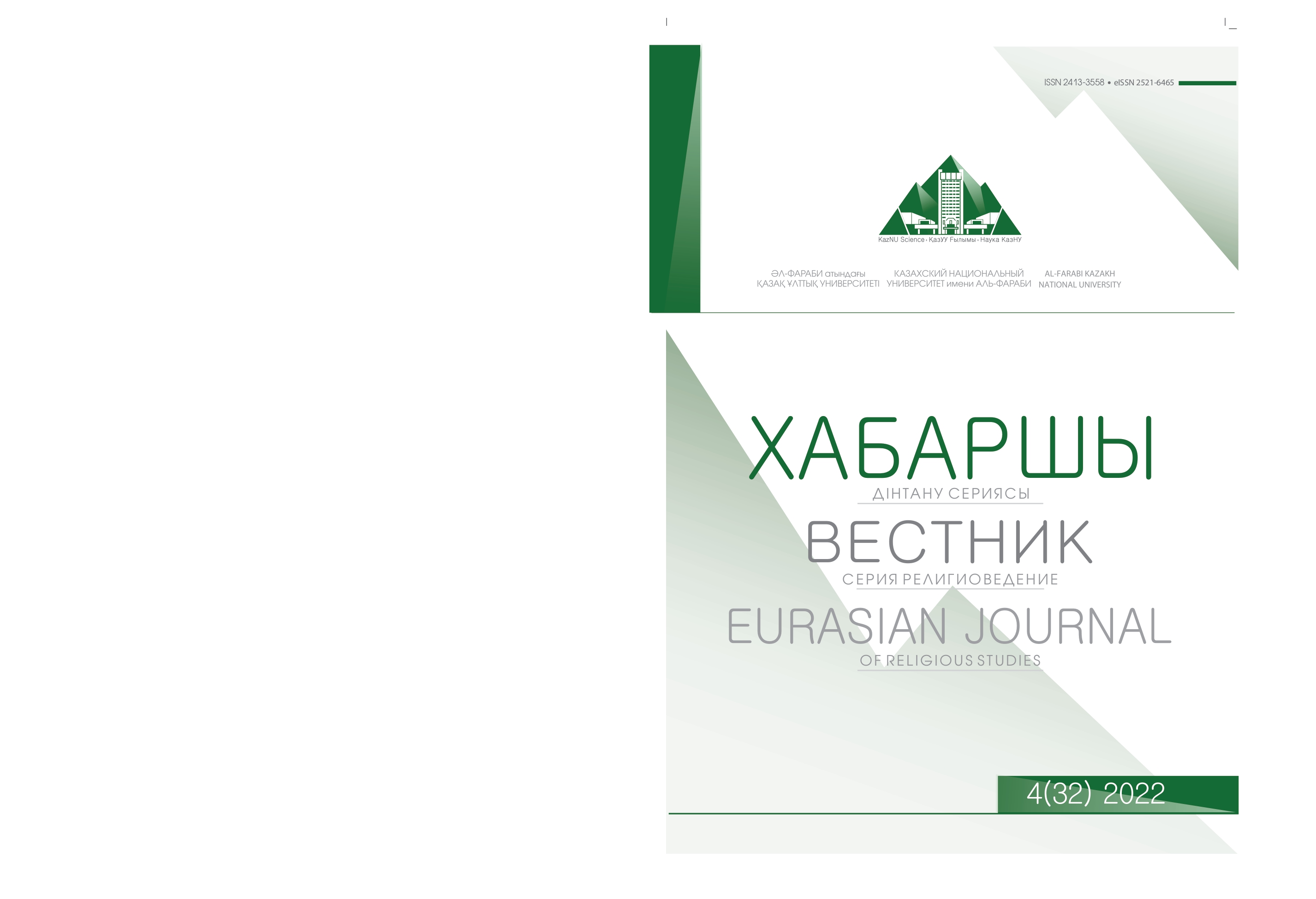Критический анализ влияния на власть и координацию концептов религия и дискурс
DOI:
https://doi.org/10.26577//EJRS.2022.v32.i4.r8Ключевые слова:
религия, власть, дискурс анализ, координация, религиозный дискурсАннотация
В статье анализируется критический дискурсивный анализ как одна из парадигм дискурсивного изучения религии. Критический дискурс-анализ рассматривает дискурсивные и критические взгляды на религию вместе и способен показать особенности и приоритеты этих сфер, которые не входят в число основных направлений современной науки. Ставится и обсуждается вопрос анализа дискурса в контексте логики, семиотики, философии языка, анализа отношений, консенсуса, легитимности этических и моральных ценностей. В статье представлена и описана важность дискурса в понимании религии как концепции и в признании роли религии в повседневных социальных отношениях посредством критического анализа дискурса и дискурсивного изучения религии. Также представляются принципы, которых нужно придерживаться для анализа дискурсивных структур и анализируются процессы возрождения и изменения в области религии. Отдельно рассматривается понятие дискурса и показаны его различные значения. В статье анализируется, как осуществляется процесс критического анализа в контексте дискурсивного исследования, и рассмотрены основные направления практического критического анализа дискурса. Возникает проблема анализа дискурсивного события в контексте неязыковых условий возникновения дискурса (экономических, политических и т.п.). Установлено, что значение дискурса c момента основания дискурсивного анализа включает в себя не только письменное или устное выражение, но и неязыковые семиотические процессы. Показано, что для каждой дискурсивной сферы эпистемические существа различаются как по ценностному значению, так и по субъективной регуляции.
Ключевые слова: религия, власть, дискурс анализ, координация, религиозный дискурс.
Библиографические ссылки
Карасик В.И.(2000) Структура институционального дискурса. Проблемы речевой коммуникации / В.И. Карасик. Саратов: Изд-во Саратов. ун-та, 236 c.
Макаров М.Л. (2003) Основы теории дискурса / М.Л. Макаров. М.: ИТДГК «Гнозис», 2003, 280 c.
Усманова А.Р. (2001) Дискурсия, дискурс / А.Р. Усманова // Постмодернизм. Энциклопедия. Минск: Интерпрессервис; Книжный Дом, 240 c.
Фуко М. (1996) Воля к истине: по ту сторону знания, власти и сексуальности / М. Фуко. – М.: Касталь, 448.
References
Barker E. (2011) The cult as a social problem. In: Hjelm T. (ed.) Religion and Social Problems. - NY: Routledge. - 198-212.
Berger P.L. (1973) The Social Reality of Religion. - London: Penguin. - 231.
Chouliaraki L. and Fairclough N. (1999) Discourse in Late Modernity. - Edinburgh: Edinburgh University Press. - 176.
Engler S. (2006) Discourse. In: von Stuckrad K (ed.) The Brill Dictionary of Religion. - Leiden: Brill. - 516–519.
Fairclough N. (1992) Discourse and Social Change. - Cambridge: Polity Press. - 259.
Fairclough N. (1995) Critical Discourse Analysis. - London: Longman. - 265.
Foucault, M. (1996). Volia k istine: po tu storonu znaniia, vlasti i seksualnosti [The Will to Truth: Beyond Knowledge, Power and Sexuality]. – Moscow: Kastal. - 448. (in Russian)
Gill S.D. (1982). Beyond «the primitive»: The religions of nonliterate peoples / S.D. Gill. Prentice-Hall, 156 p.
Hamilton M. (2001) The Sociology of Religion. Second Edition. London: Routledge. - 320.
Jasinski J. (2001) Sourcebook on Rhetoric: Key Concepts in Contemporary Rhetorical Studies. Thousand Oaks, CA: SAGE. - 675.
Karasik, V.I. (2000). Struktura institutsionalnogo diskursa. Problemy rechevoi kommunikatsii [The structure of institutional discourse. Problems of speech communication]. Saratov: Izd-vo Saratov. un-ta. – 236. (in Russian)
Locke T. (2004) Critical Discourse Analysis. London: Continuum. - 104.
Luke A. (1995) Text and discourse in education: an introduction to critical discourse analysis // Review of Research in Education, №21, 3–48.
Makarov, M.L. (2003). Osnovy teorii diskursa [The basics of discourse theory]. M.: ITDGK «Gnozis». - 280. (in Russian)
Phillips L. and Jørgensen M.W. (2002) Discourse Analysis as Theory and Method. London: SAGE. – 230.
Potter J. and Wetherell M. (1987) Discourse and Social Psychology: Beyond Attitudes and Behaviour. London: SAGE. – 216.
Richardson J.E. (2007) Analyzing Newspapers: An Approach from Critical Discourse Analysis. Basingstoke: Palgrave. – 287.
Thompson J.B. (1990) Ideology and Modern Culture. Stanford, CA: Stanford University Press. – 372.
Usmanova, A.R. (2001). Diskursiia, diskurs [Discursive activity, discourse]. Minsk: Interpresservis; Knizhnyi Dom. – 240. (in Russian)
Van Dijk T.A. (1993) Principles of critical discourse analysis // Discourse and Society. №4(2), 249-283.













